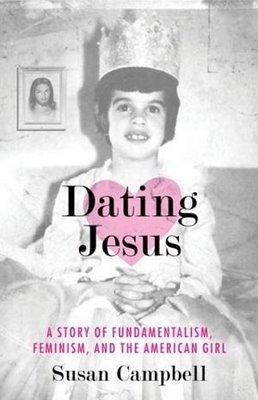Dating Jesus: A Story of Fundamentalism, Feminism, and the American Girl

As a feminist who was raised within the Christian fundamentalist paradigm, I was immediately drawn to this memoir. Though Susan Campbell and I come from different flavors of fundamentalism, all of the experiences she writes about ring true. I suspect they would ring true for all women who were raised within a patriarchal religion (fundamentalist or not), as well as women who may not have been raised with any religion at all, but recognized prejudice in American society just the same.
Campbell grew up in the South during the 1960s and '70s, where she struggled with what was expected of her as a female. In Dating Jesus, she describes countless scenarios of rebellion, which make the reader simultaneously laugh and pump her fist in the air in solidarity and support. One such incident took place when Campbell asked her Sunday school teacher why women could not be preachers. Her teacher gave her a pat answer, yet even at a young age, Campbell was skilled in rhetoric and debate. She continued to dialogue respectfully with her teacher until he stepped out and returned with her mother, who took her out of the Sunday school class to spend the rest of the time in the nursery. “The meaning is not lost on me,” Campbell writes. "For asking questions, I will be placed among babies who slobber and fill their pants. It is a public shaming."
Dating Jesus is not limited to describing faith-based injustices against women. It also paints a picture of America at a time before Title IX, through the eyes of a tomboy who desperately wants to be treated as her brothers are, but is constantly expected to behave like "a good Christian girl." This reprimand comes from all sides, including her school principal when Campbell flips off a fellow student athlete as he shows off his new school-bought sneakers. The female sports teams at the school had been forced to wear the same ratty uniforms while the boys were given new uniforms for each sport.
Yet the fact remains that Campbell's memoir is about her tumultuous relationship with Jesus, whom she views as her boyfriend from age eight on. And who can blame her? She is brought up in a culture of loving and adoring Jesus and living her life in order to make him happy. One of the best things about this memoir, however, is that it does not end with Campbell dismissing Christianity altogether. She is honest enough to say that while she is disappointed by the route the church has taken, where misogyny and strict legalism reign in place of Jesus' message of love and acceptance, she is still a Christian on some level. She refers to people like herself as "Christ-haunted," never being able to depart fully from the faith. When, as adults, her brother says to her, "Fundamentalism broke off in us, didn’t it?" the reader who has lived this type of life knows exactly what he means.
Campbell ends on a hopeful note. She talks about the way Jesus treated women in the Bible, which was very different from how the rest of the world treated them. They were seen as outcasts, unworthy of attention or respect, but Jesus spent time talking with them. He valued them in a way that was revolutionary at the time. Campbell's final realization is that the Jesus she "dated" throughout childhood was "someone’s idea of Jesus, but not the real one." She notes, "The real Jesus wouldn’t have loved me less because of my gender. The real Jesus wouldn’t have weighed me down with rules—a list of do's and don'ts that serve no real purpose. The real Jesus would have had a sense of humor about the whole thing, goddammit."
I enjoyed this book, too, although I wanted to know more about the period in her life when she decided to leave the church and her marriage broke up. Seems like we were missing some pieces.
Thank you for the review. I'm interested in reading this book. I didn't grow up in a fundamentalist church or religion, but I often felt/saw the sexism of patriarchial churches. It made me not want to find a church although I sought a relationship with Jesus. I have a relationship with Jesus but I still seek a church.
Thanks for the great review on what sounds like an interesting read.